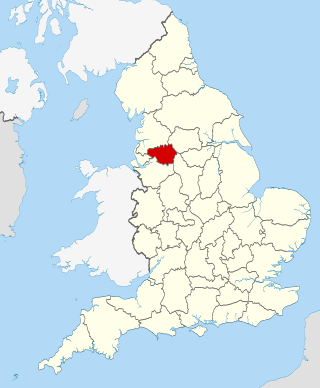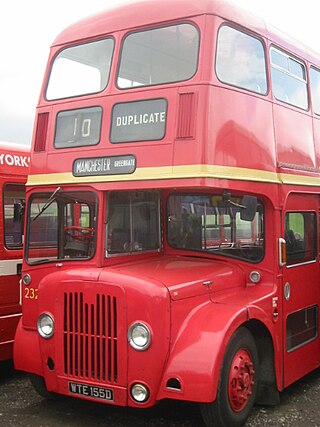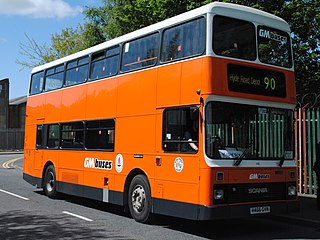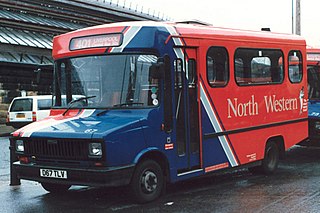
Manchester Metrolink is a tram/light rail system in Greater Manchester, England. The network has 99 stops along 64 miles (103 km) of standard-gauge route, making it the most extensive light rail system in the United Kingdom. Over the 2023/24 financial year 42 million passenger journeys were made on the system.

Transport for Greater Manchester (TfGM) is a local government body responsible for co-ordinating transport services throughout Greater Manchester in North West England. It is an executive arm of the Greater Manchester Combined Authority (GMCA), the city region's administrative authority. The strategies and policies of Transport for Greater Manchester are set by the GMCA and its Greater Manchester Transport Committee (GMTC). The committee is made up of 33 councillors appointed from the ten Greater Manchester boroughs, as well as the Mayor of Greater Manchester.

Free bus is a zero-fare bus system that operates in Greater Manchester. The system was first introduced in Manchester city centre in 2002, with three routes linking the city's major thoroughfares and stations with its main commercial, financial and cultural districts.

Bury Interchange is a transport hub in the town of Bury, Greater Manchester, England. Opened in 1980, it is the northern terminus of the Manchester Metrolink's Bury Line, which prior to 1992 was a heavy-rail line. It also incorporates a bus station.

Stagecoach Manchester is a major bus operator in Greater Manchester, operating franchised Bee Network bus services on contract to Transport for Greater Manchester (TfGM). It is the largest UK bus subsidiary of Stagecoach Group outside of Greater London, as well as the largest within the metropolitan county of Greater Manchester by passenger numbers, carrying up to 96.2 million passengers in 2019/20.

JPT Bus Company, was a bus company based at Middleton, Greater Manchester, England. Operations ceased on 25 April 2014, with the business taken over by Stagecoach Manchester.

Lancashire United Transport (LUT) was a tram, bus and trolleybus operator based at Howe Bridge in Atherton, 10 miles north west of Manchester. It was the largest independent bus operator in the United Kingdom until its acquisition by the Greater Manchester Passenger Transport Executive in 1976.

The transport infrastructure of Greater Manchester is built up of numerous transport modes and forms an integral part of the structure of Greater Manchester and North West England – the most populated region outside of South East England which had approximately 301 million annual passenger journeys using either buses, planes, trains or trams in 2014. Its position as a national city of commerce, education and cultural importance means the city has one of the largest and most thorough transport infrastructures which is heavily relied upon by its 2.8 million inhabitants in the Greater Manchester conurbation and further afield in the North West region. Public transport comes under the jurisdiction of Transport for Greater Manchester.

GM Buses was a major bus operator serving the ten metropolitan districts of Greater Manchester in North West England. The company was formed in February 1986 by the Greater Manchester Passenger Transport Executive prior to deregulation on 26 October. In December 1993, it was split into GM Buses North and GM Buses South in order to increase competition for services in the area, before they were sold to the FirstGroup and Stagecoach respectively.
The Passenger Transport Executive (PTE) bus operations were the bus operating divisions of the passenger transport executives in the United Kingdom. In 1986 they underwent a process of deregulation and privatisation, forming some of the largest private bus companies in the UK outside London, with all being sold to their employees or management. Despite their relative size and lucrative operating areas, none of the companies survived beyond the late 1990s, with all falling into the hands of the major bus groups, who had their origins in privatised regional subsidiaries of the former National Bus Company and the Scottish Bus Group.

North Western Road Car Company was a bus operator based in Liverpool, England. The company operated between 1986 and 1998.

The Wilmslow Road bus corridor is a 5.5-mile-long section of road in Manchester that is served by a large number of bus services. The corridor runs from Parrs Wood to Manchester city centre along Wilmslow and Oxford Roads, serving Didsbury, Withington, Fallowfield and Rusholme.

Greater Manchester bus route 192 is a high frequency bus route runs between Hazel Grove in the Metropolitan Borough of Stockport and Piccadilly Gardens in Manchester city centre. It is operated by Stagecoach Manchester.

Between 1901 and 1949 Manchester Corporation Tramways was the municipal operator of electric tram services in Manchester, England. At its peak in 1928, the organisation carried 328 million passengers on 953 trams, via 46 routes, along 292 miles (470 km) of track.

The history of Manchester Metrolink begins with its conception as Greater Manchester's light rail system in 1982 by the Greater Manchester Passenger Transport Executive, and spans its inauguration in 1992 and the successive phases of expansion.

Greater Manchester Passenger Transport Executive was the public body responsible for public transport in Greater Manchester between 1974 and 2011, when it became part of Transport for Greater Manchester.
This timeline lists significant events in the history of Greater Manchester's light rail network called the Manchester Metrolink.

Greater Manchester Bus route 17 is a Bee Network bus route operates between Norden and Manchester Shudehill Interchange. From Norden it travels through Rochdale Interchange, Sudden and Castleton to Middleton bus station, and then continues through Blackley, Harpurhey and Collyhurst to Manchester Shudehill Interchange. It has a sister service 18 which operates on the same route between Manchester and Middleton, but terminates at Langley instead of Rochdale Interchange.

Stockport Corporation Tramways operated a tramway service in Stockport, England, between 1901 and 1951. It was preceded by a horse tramway from Levenshulme to Stockport, which opened in 1880, and was ultimately run by the Manchester Carriage and Tramways Company. A second independent horse tramway opened in 1890, running to Hazel Grove. In 1899 the Corporation bought the first line, electrified it, and leased it back to the operating company. Their powers to buy the Stockport and Hazel Grove Tramway, authorised by the same Act of Parliament, were not exercised until 1905.

Greater Manchester bus route 53 is a bus route runs between Salford Shopping Centre and Cheetham Hill. It is operated by Stagecoach Manchester on contract from Transport for Greater Manchester.


















